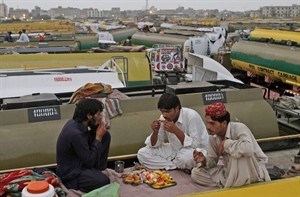
Pakistani NATO oil tanker drivers, break their fast on top of the tankers, during the Muslim holy fasting month of Ramadan, in a compound in Karachi, Pakistan, Tuesday, July 31, 2012. Pakistan and the United States signed a deal regulating the shipment of American troops supplies to and from Afghanistan, prompting Washington to agree to release over $1 billion in frozen military aid. (AP Photo/Shakil Adil)
August 02, 2012 - 6:48 AM
ISLAMABAD - The top U.S. commander in Afghanistan discussed border co-ordination with Pakistan's army chief Thursday during his first visit since Islamabad ended its seven-month blockade of NATO troop supplies.
Pakistan closed its Afghan border to NATO in November in retaliation for American airstrikes that killed 24 Pakistani soldiers, and the two sides have held a series of meetings since then to try to prevent such an incident from occurring again.
Pakistan reopened the route in early July after the U.S. finally apologized for the deaths, which Washington said were an accident. Both countries have made public statements since then about the need to move forward and patch up their troubled relationship, but major disagreements continue.
"We are making significant progress toward building a partnership that is enduring, strategic, carefully defined, and that enhances the security and prosperity of the region," a press release quoted Gen. John Allen as saying after his meeting with Pakistan's army chief, Gen. Ashfaq Parvez Kayani.
The U.S. has long been frustrated by Islamabad's refusal to target Afghan Taliban militants and their allies using Pakistani territory to stage attacks against troops in Afghanistan. Many analysts believe Pakistan is reluctant to target groups with which it has strong historical ties and could be useful allies in Afghanistan after foreign forces withdraw.
Pakistan has denied this, saying its forces are stretched too thin fighting Pakistani Taliban militants at war with the state. It has also criticized NATO and Afghan forces for not doing enough to stop Pakistani militants holed up in Afghanistan from launching attacks across the border into Pakistan.
Pakistan has also demanded the U.S stop drone strikes targeting militants in its northwest tribal region, although officials within the government and the military have supported these attacks in the past. The strikes are unpopular in Pakistan because many people believe they mostly kill civilians — an allegation denied by the U.S.
The months-long dispute over the deaths of the Pakistani troops in November and the subsequent closure of the NATO supply line intensified feelings of anger and distrust on both sides.
Even though Pakistan reopened the supply line in early July, bureaucratic delays, disputes over compensation and security concerns have prevented the flow of trucks from really picking up steam. One of the two Afghan crossings used by NATO has been closed for about a week as officials work with the Pakistani military to protect against militant attacks.
But both sides have an incentive to prevent their troubled relationship from totally falling apart.
The U.S. needs Pakistan's help to negotiate a peace treaty with the Taliban in Afghanistan, while Islamabad wants Washington to continue sending billions of dollars in aid that shore up its shaky government finances.
News from © The Associated Press, 2012